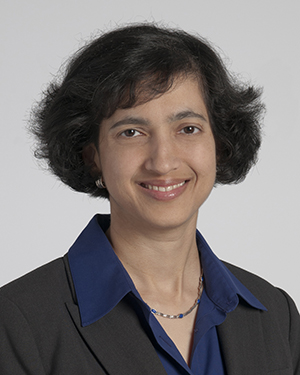Research News
02/03/2023
From postdoc to associate research staff: A journey shaped by mentors
Dr. Harpreet Kaur found more than she was looking for when she applied to a postdoctoral fellowship at Cleveland Clinic.

Harpreet Kaur, PhD, was ready for a change of scenery and up for a new challenge. Born and educated in New Delhi, India, Dr. Kaur applied to a postdoctoral fellowship at the Cleveland Clinic – almost on a whim.
Through that position, Dr. Kaur blazed a path forward for exploring the neurological diseases that captured her attention during her Master’s program at Jiwaji University. She also found a mentor in Asha Kallianpur, MD, MPH, Associate Staff in the Genomic Medicine Institute (GMI).
When Dr. Kaur’s application first landed on her desk, GMI Department Chair Charis Eng, MD, PhD, immediately recognized that her skill sets matched what Dr. Kallianpur had been looking for, and that the Kallianpur lab would be a good fit. Dr. Kallianpur, whose lab focuses on the role of iron in neurocognitive disorders and other phenotypes in people with HIV, recognized Dr. Kaur had research experience and the right combination of skills hard to find in a mentee.
“She was very organized and methodical, which is critical in data analysis,” says Dr. Kallianpur. “At that time, I had not mentored any postdoctoral fellows with a purely basic science background, which I told Harpreet. But I knew this was an opportunity for us to learn alongside one another, and complement each other’s skills for the benefit of science.”
Mentor and mentee: Learning together
Dr. Kaur’s PhD research focused on schizophrenia; a psychiatric disorder marked by patients disconnecting from reality. Her work explored genetic variants and changes in cell signaling for schizophrenic patients, digging into the underlying biological changes associated with the disorder.
Dr. Kallianpur’s lab studies how the dysregulation of iron influences the onset and progression of chronic inflammatory conditions.
Drs. Kaur and Kallianpur met weekly to discuss Dr. Kaur’s ongoing projects, milestones, goals and personal well-being. With her mentor’s guidance and encouragement, Dr. Kaur improved her biostatistical skills, verbal and written language skills and career opportunities. Dr. Kaur felt trusted in her postdoctoral role, so she and Dr. Kallianpur were able to regularly trade ideas back and forth.
“I always felt heard,” says Dr. Kaur. “I was always given time to explain myself and my plan, whether that related to my current research or research I wanted to pursue in the future.”
New opportunities
During her postdoctoral fellowship, Dr. Kaur published two first-author papers, co-authored five others and received poster and travel awards for her work.
Dr. Kaur’s experience in studying neurological disorders helped her recognize the importance of understanding neurocognitive complications in patients with HIV, a disease that commonly causes altered iron metabolism.
Dr. Kaur recently was promoted to associate research staff and accepted a new position in the Neurological Institute.
“One benefit to working at Cleveland Clinic is the ability to move from research to watching clinical outcomes,” says Dr. Kaur. “I’ve published many papers on basic science. Now, I get to investigate brain disorders, like Parkinson’s disease, Huntington's disease and migraines. Being able to see the impact on patients is incredibly rewarding.”
In her new role, Dr. Kaur will help create the infrastructure and organization of clinical databases for optimal data-mining and provide assistance in the outcomes of research activities and proposals. She attributes a great deal of her success to the guidance of her mentors.
“There’s is a difference between a boss, a leader and a mentor,” says Dr. Kaur. “I’ve been fortunate to work with a mentor who has provided me the opportunity to work at my own pace, pursue new and challenging ideas, and supported me when I needed help.”
Featured Experts
News Category
Related News
Research areas
Want To Support Ground-Breaking Research at Cleveland Clinic?
Discover how you can help Cleveland Clinic save lives and continue to lead the transformation of healthcare.
Give to Cleveland Clinic